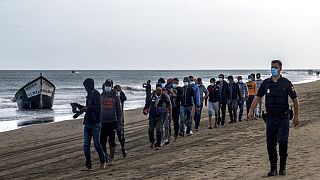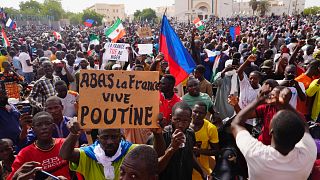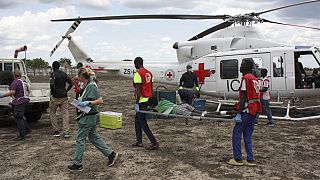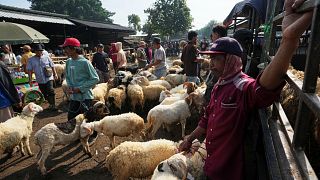Niger
After ten months of living on the street, Sharon Jeeply, a migrant from Liberia, just wants to go home.
She is one of some 7,000 migrants stranded in Niger unable to be repatriated.
Niger's junta has closed its airspace and regional countries have imposed severe travel and economic sanctions, closing land borders.
Momo Kmulbah is another of those trying to get back home, for him in Liberia.
He says many of them have nowhere to turn for help but that U.N. officials have told him to be patient.
The 36-year-old has been sleeping on the pavement in Niger's capital, Niamey, with his two daughters and wife since June and they beg for food.
“Our children don’t have food to eat. I feel confused when I wake up in the morning,” Kmulbah said.
COOPI, an Italian aid group that provides shelter for migrants in Niger's northern town of Assamakka near the border with Algeria, said that since the coup an additional 1,300 people have entered its center trying to return home.
COOPI assists the U.N. in hosting people, but has warned that it will run out of food and water if the borders don't open soon.
Niger is an important route both for Africans trying to reach Libya as a jumping off spot to cross the Mediterranean to Europe and those who are returning to their homes with help from the United Nations.
It has also been a key partner for the European Union (EU) in working to stem the flow of migrants.
Niger abided to most of the EU’s demands, under President Mohamed Bazoum’s leadership as interior minister, dismantling in large part established smuggling and trafficking networks around Agadez that took migrants and refugees to Libya and Algeria.
The country received nearly 300 million euros under the EU Trust Fund for Africa, a multi-billion-dollar program aimed at fighting the root causes of migration in the continent.
At the end of July, mutinous soldiers overthrew Niger’s democratically elected president and closed its airspace.
The closure of the airspace has restricted access to the country’s regions, posing difficulties in reaching vulnerable populations in need of aid.
The current situation in Niger poses significant risks to international migrants such as migrant workers and refugees, internally displaced persons, and victims of trafficking, as well as vulnerable communities, leaving them in even more precarious conditions.
It’s unclear how cooperative the new military leaders will be with the EU, which has now frozen assistance to Niger.











01:19
"Such good English": Trump compliments Liberian president, a native English speaker
00:51
Liberia's former president William Tolbert symbolically reburied, 45 years after his murder
Go to video
US embassy in Monrovia tells visa applicants to make social media accounts 'public' for vetting
01:24
DRC and Liberia elected to serve 2-year term on UN Security Council
Go to video
Tunisia dismantles encampments housing migrants stranded en route to Europe
01:13
Niger's junta, Abdourahamane Tchiani sworn in as transitional president for a period of five years